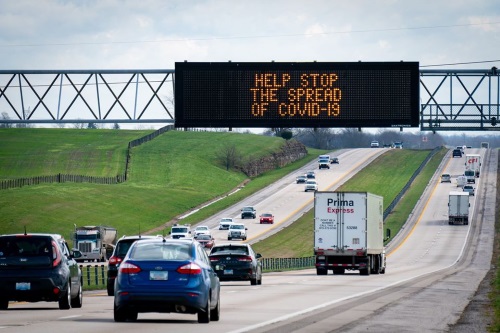Several states are issuing, clarifying, and in some cases extending a variety of temporary truck weight waivers in support of national COVID-19 relief and prevention efforts.
[Above photo by the KYTC.]
On April 13, the California Department of Transportation announced it would issue temporary special permits for overweight trucks transporting COVID-19 emergency supplies as part of the recent State of Emergency declaration issued by Governor Gavin Newsom (D) in early March and subsequent activation of the federal Stafford Disaster Relief and Assistance Act.

“Authorizing these special exceptions clears a path for greater volumes of material vital in the fight against COVID-19,” noted Toks Omishakin, Caltrans director, in a statement. “Emergency medical supplies and equipment, groceries, perishable items, water and countless other essential items will now reach their destinations more rapidly than they did before, at a time when people need them most.”
The agency said it will issue permits for overweight trucks on the state highway system and will help support transportation operators in obtaining permits from local agencies for local roads. These permits increase the maximum allowable gross vehicle weight from 80,000 to 88,000 pounds and will be valid until further notice, Caltrans added.

New Jersey Governor Phil Murphy (D) issued a similar order on April 8, allowing a temporary increase in the maximum weight limit for commercial trucks on certain interstate highways and toll roads from 80,000 pounds to 92,000 pounds for vehicles transporting COVID-19 relief supplies.
“Consistently improving our supply chain for COVID-19 relief supplies, including PPE [personal protective equipment], ventilators, and testing kits, is one of our highest priorities,” said Gov. Murphy in a statement. “Increasing the weight limit for vehicles carrying these critical supplies is a necessary step that will allow more supplies to reach [those] in need.”
“Getting needed COVID-19 relief supplies where they are needed is critically important to saving lives,” added Diane Gutierrez-Scaccetti, the New Jersey Department of Transportation commissioner.

“Increasing the maximum weight limit on vehicles carrying these supplies will help ensure that needed supplies get to the doctors, nurses, healthcare workers, and everyone fighting this pandemic as quickly as possible,” she said. “Increasing the weight carried by trucks creates efficiencies in moving goods while addressing the reduced number of drivers as a result of the virus.”
Meanwhile, the Kentucky Transportation Cabinet extended until June 1 an existing emergency order that temporarily lifts regulatory restrictions on motor carriers delivering goods and services critical to COVID-19 pandemic relief.
That order applies to vehicles engaged in response to the pandemic, temporarily relieving commercial truck drivers from maximum driving times and weigh station stops. It also authorizes the KYTC’s Department of Vehicle Regulation to waive permit fees for overweight/over-dimensional vehicles.

The order is in keeping with the declaration of an emergency by Governor Andy Beshear (D) as part of a “sweeping effort” to protect Kentuckians and combat the spread of COVID-19, noted Jim Gray, KYTC’s secretary.
“We’re pleased to play a part in ensuring needed supplies get to Kentuckians and neighboring states as quickly as possible in the interest of public health and safety,” he said in a statement.
The Oregon Department of Transportation, however, took a moment to clarify truck weight exemptions on April 13 issued as part of the state’s Emergency Declaration back on March 8.

The agency said that on all interstates and state highways, while commercial trucks may exceed legal gross weight up to 105,500 pounds, they must still comply with legal weight limits of 20,000 pounds for single axles and 34,000 lbs. for tandem axles.
The Oregon DOT added that the weight exemptions only apply to trucks transporting items deemed necessary per the expanded Emergency Declaration issued by Federal Motor Carrier Safety Administration on March 18.
 States
States
Podcast: Flashing LED Lights Can Boost Roadway Safety
December 5, 2025 States
States

